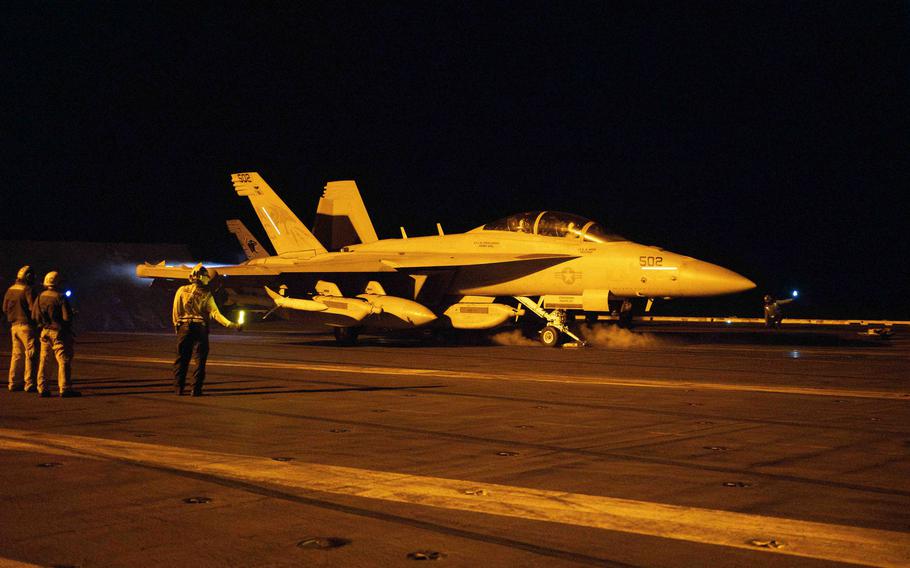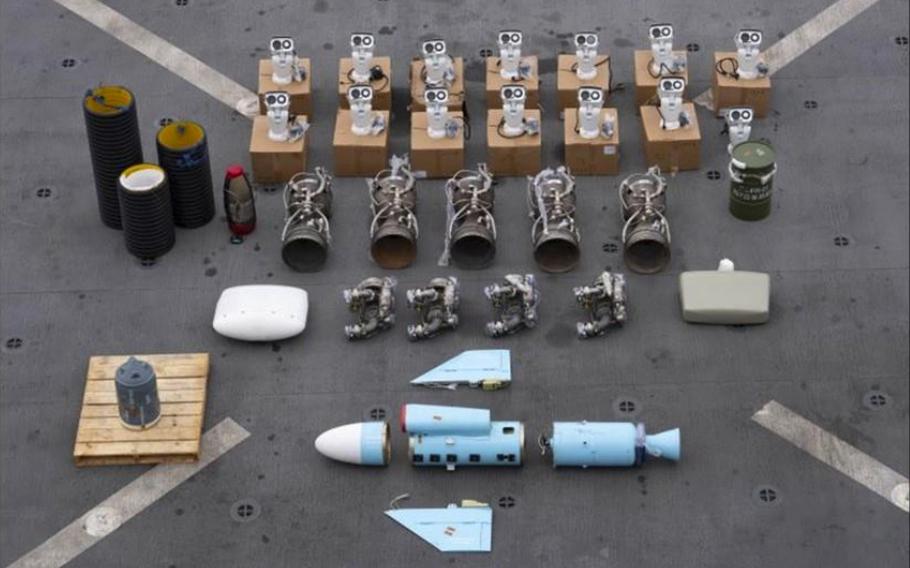Middle East
AnalysisUS faces growing challenge in bid to contain Middle East violence
The Washington Post January 17, 2024

A U.S. fighter prepares to take off from the USS Dwight D. Eisenhower on Jan. 12, 2024, to conduct strikes against sites used by Iranian-backed Houthi rebels in Yemen. (Zachary Elmore/U.S. Navy)
The United States faced intensifying military action by Iran and its allies on Tuesday, an escalating threat to the Biden administration’s effort to contain violence across the Middle East following the launch of Israel’s war with Hamas militants.
A drumbeat of tit-for-tat incidents between U.S. forces and Iranian-backed armed groups, including a new round of strikes Tuesday against Houthi militants in Yemen and Iranian strikes into Iraq and Syria on Monday, served as a test of Washington’s attempt to limit regional instability and avoid a direct confrontation with Tehran.
The incidents also highlight the potential for miscalculation as military action accelerates and the United States continues support for close ally Israel, whose response to Hamas’ bloody Oct. 7 attacks has killed more than 24,000 people in the Gaza Strip, most of them Palestinian civilians, and galvanized opposition across the Arab world to Israel and its chief backer.
Tuesday’s strike on the Iranian-linked Houthi movement in Yemen, the third such attack in the last week, targeted four sites where the rebels were preparing to launch missiles against commercial shipping vessels, U.S. Central Command said in a statement.
The Houthis, one powerful faction in Yemen’s ongoing civil war, have framed their campaign against merchant ships transiting the region, which has included more than 30 drone and missile attacks since November, as retaliation for Israel’s war in Gaza.
The group almost immediately made good on its vow to continue its campaign, launching an anti-ship ballistic missile that struck the Maltese-flagged ship M/V Zografia. No one was injured and the ship continued its voyage.
The recent violence has also revived concerns about militant networks not involved in the backlash by Iranian-linked groups to Israel’s operation in Gaza. The rare airstrike into Syria by Iran’s Revolutionary Guard Corps on Monday targeted what Tehran said were sites linked to the Islamic State, the extremist group that claimed responsibility for a deadly twin bombing this month in the Iranian city of Kerman.
While that action appeared unrelated to recent violence pitting Israel and the United States against Iranian-sponsored militants, Iran also conducted a strike on what Iranian officials described as an Israeli spy site in Iraqi Kurdistan, a move that prompted outcry by officials in Baghdad and Irbil, the capital of the semiautonomous northern region.
Gerald Feierstein, a former U.S. ambassador to Yemen who is now a senior fellow at the Middle East Institute, said Iran appeared determined, like the United States, to stay out of a direct conflict with the U.S. military and its allies. He pointed to the fact that Lebanese militia group Hezbollah, Iran’s largest and most powerful proxy, had not unleashed the full power of its vast missile arsenal against Israel in recent months. On Tuesday, Israeli forces conducted dozens of strikes across the border into southern Lebanon.
Likewise, while Iranian-backed militias in Iraq and Syria have launched regular attacks on U.S. military facilities in both countries, they often fall far from their purported targets and inflict limited damage. In what has appeared to be a parallel American bid at restraint, retaliatory U.S. strikes have been limited in scope, though an airstrike in Baghdad earlier this month killed a militia commander accused of orchestrating violence against Americans deployed there.

A photo released by the U.S. military's Central Command shows what it is described as Iranian-made missile components bound for Yemen's Houthi seized from a vessel in the Arabian Sea. (U.S. Central Command)
Feierstein said that while Iran appears determined to refrain from direct involvement in the Gaza situation, the current U.S.-Houthi showdown may serve Tehran’s interests.
“Their partner in the ‘axis of resistance’ is standing up on behalf of Palestinians, but it’s not crossing American red lines,” he said, referring to a loose coalition of groups that, along with Iran, seek to push back against U.S. influence in the region. “It’s not likely to get us into a conflict with Iran directly, and so everybody can live at this level that they’re at right now.”
How long that status quo can be maintained is unclear. The United States positioned additional military assets in the Middle East following Hamas’ attacks into Israel, hoping to deter armed groups linked to Iran from seizing an opportunity to strike their shared enemy Israel and its sponsor, the United States. The U.S. military also established a stepped-up multinational effort to deter maritime attacks that have significantly disrupted commercial shipping in the Red Sea.
John Kirby, a spokesman with the White House National Security Council, said Tuesday that when the United States launched dozens of strikes in Yemen last week, senior U.S. officials “fully anticipated” that the Houthis would “probably conduct some retaliatory strikes.”
He said that while the United States believed it could not permit the attacks on commercial ships, neither did it seek war with the Houthis.
“We’re not looking to expand this,” Kirby said. “They still have time to make the right choice, which is to stop these reckless attacks.”
As part of its evolving response to the Houthi actions, the Biden administration is planning to place the Yemeni group back on a list of global terrorist organizations, two people familiar with the decision said on Tuesday. The decision to designate the Houthis as specially designated global terrorists marks a reversal of a step the administration took in early 2021 out of concern about exacerbating an already dire humanitarian situation in Yemen.
U.S. forces have also sought to stem the Houthi campaign in part by interdicting the supply of weapons from Iran to Yemen. On Thursday, Navy SEALs boarded a small ship in the Arabian Sea, finding Iranian-made missile warheads and related weapons components. Two troops were lost at sea during the operation, prompting a search-and-rescue operation that was still underway Tuesday.
Iran’s strikes in Iraq hit the “espionage headquarters” of Israel’s Mossad intelligence agency that had been used to plan “terrorist” acts against Iran, the Revolutionary Guard said in a statement. Iraqi and Kurdish officials deny the claims. The Israeli prime minister’s press office declined to comment on Iran’s assertions.
Iraq’s national security adviser said he visited a home of one of the victims of the strike. “It was revealed that the claims suggesting the targeting of a Mossad headquarters have no basis in truth,” Qasim al-Araji said in a post on X, the social media platform.
Iraq recalled its ambassador from Tehran following the strikes, the Foreign Ministry said in a statement Tuesday. The ministry also said Iran’s top diplomat in Baghdad had been summoned over the attack and was handed a “protest note.”
U.S. officials said no American personnel were injured in the strikes but condemned Iran’s actions.
“We oppose Iran’s reckless missile strikes, which undermine Iraq’s stability,” State Department spokesperson Matthew Miller said in a statement.
The risks of regional conflagration were further underscored Tuesday by a spate of Israeli airstrikes into Lebanon, marking an escalation in the ongoing confrontation between Israel and Iranian-backed Hezbollah. Also on Tuesday, Iran conducted airstrikes on what it said were militant targets in Pakistan. Pakistan’s government condemned the action by its neighbor, saying civilians were killed.
George reported from Dubai and Salim reported from Baghdad. Michael Birnbaum, Kyle Melnick and Niha Masih contributed to this report.